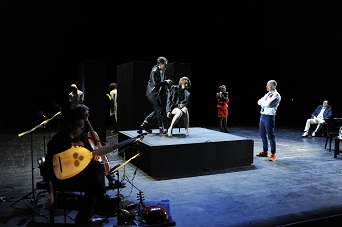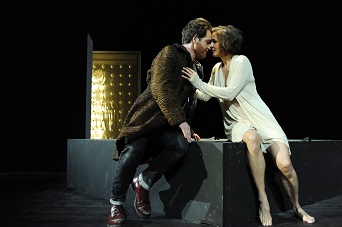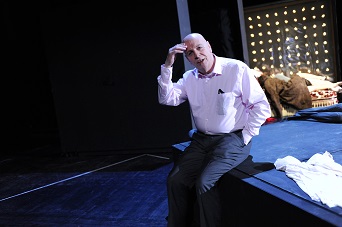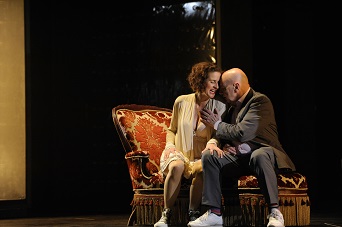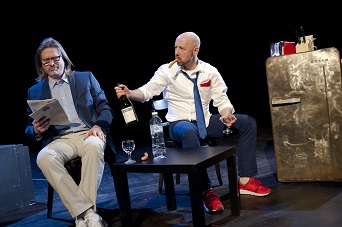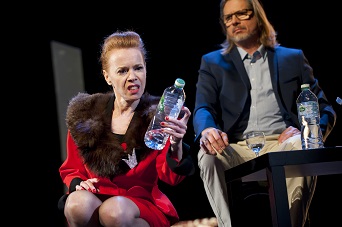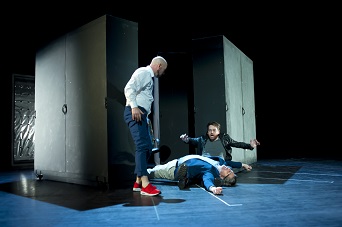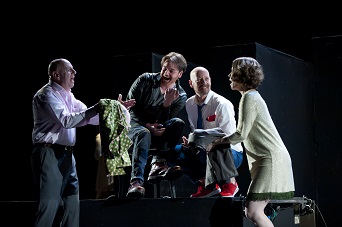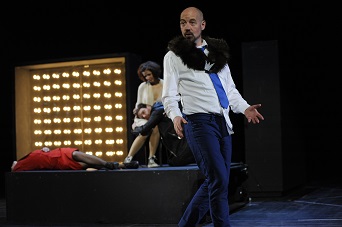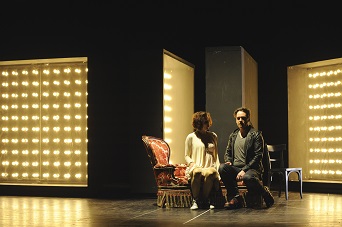2016 February 4rth
L'INCORONAZIONE DI POPPEA (1642)
Libretto: Giovanni Francesco Busenello
Music: Claudio Monteverdi
Premiere: Theater der Stadt Schweinfurt on 4 February 2016 at 7.30 p.m.
Further performances: Theatre Minden 7/8 March, Cuvilliés Theater Munich, 13/15/16/17 April,
Lindenhalle Ehingen 26 October, Theatre Aschaffenburg 28 October 2016,
Lessingtheater Wolfenbüttel 30 October, Theater Winterthur 23/24/25 November 2016
Musical direction, version: Hans Huyssen
Ensemble così facciamo
Director, version: Martina Veh
Stage and costumes: Nikolaus Maier
Lighting: Benedikt Zehm
Poster design: Barbara Brinkmann
Photos: Hermann Posch
Production management: Eike Grunert, Alexandra Zöllner
Singers:
Poppea, Amore, Venere: Stephanie Krug (soprano)
Nerone: Christian Sturm (tenor)
Ottone, Amore Terzo: Christopher Robson (countertenor)
Ottavia, Virtù, Amore Secondo: Martina Koppelstetter (mezzo)
Drusilla, Fortuna, Pallade, Amore Primo: Monika Lichtenegger (soprano)
Seneca, Soldier 2, Mercurio: Joel Frederiksen (bass)
Arnalta, Lucano, Soldier 1, Libeto: Carsten Fuhrmann (tenor)
An erotic political thriller for the people (1642)
Great love is everything,
but never harmless.
A political satire on a declining empire.
Being and appearances are reflected in the light of the different perspectives, which cover the human abysses like a cloak. Seven characters on their way through the thicket of power:
Nero, tyrant of a world empire, Poppea, his mistress. Political violence, adultery, ordered suicide in a world of political, social and ethical upheaval and uncertainty. How does it end, this story? The title gives it away.
Also just people of flesh and blood, between heaven and hell in the palaces of power and the excess of love in all its facets. They are capable - to their own astonishment - of walking over dead bodies, but also have a sensitive sense of their true longings and fears - in the mesh of ambition, greed for success, hope and despair of existence.
The playing field is ambivalent between morality and love. The power of influence and enchantment, intrigue wrapped in flirtatious eroticism. The truth? Who cares about the truth! Free and irreverent, the desire for love rules and rules.
We have created seven continuous characters, even if some, with regard to the original material of the opera, sometimes take over lines from other characters.
The contrasts determine the plot and the psychology of the characters. There is nothing Nero wants more than Seneca's death, the death of this state ideologue whose promised fruit from the tree of civic knowledge has already rotted, not least through his own behaviour. But who would have thought that Seneca would be so consistent as to carry out the order to kill himself? Who wants the bad, of course, everyone wants the good! Freedom? Where are the limits? Insistent gestures of futile protest. Nero himself was too often in his own life the plaything of the forces of power. Even at the time of the plot of our opera, he has a few murders to answer for. Allegedly, Seneca was also involved in the murder of Nero's mother Agrippina, whom Nero had raised to the throne at the age of 16, as well as - so the rumour goes - of his stepbrother Britannicus. Self-determination - Nero's dream at the side of the inspiring Poppea, his great love, a love that questions everything, beauty queen and streamlined champion of her goal: to become Empress of Rome. Any means will do. Ottone, then married to Drusilla, even unwittingly brought her into contact with Nero. Who wouldn't want to seize such an opportunity to be chosen by Nero? But she is not naive. She knows the doubts and abysses of a hot affair, which - what a fate to whom this happens - actually turns out to be the great love of her life with Nero.
Is man capable of acting according to ethical norms or morals at all? Aren't much lower motives always the driving force? Greed for recognition? Will to power? Eroticism and the great love? The desire for spiritual and actual freedom? How free can our decisions be in the playing field of ideology, morality and the desire for recognition and selfishness? Being and appearance. Imperial arbitrariness of power as well as sensual perception are wavering and uncertain: a cloak over human depravity. No one knows this human depravity better than a man who comes from the streets and has kept himself alive at all costs in order to gradually climb higher and higher in the hierarchy, who is at the disposal of the powerful with body and soul - whatever they desire, to serve them as mirror and amusement, comfort and support, without being a servant. Arnalto, scarred by life and its compromises, seems to be the winner in the game because he has nothing to lose. He is the best friend of Poppea, with whom he has a very special relationship: Only with her does he share his true thoughts. How was the beautiful Empress Ottavia, who at the age of 13 was already married to her close relative Nero, supposed to endure the continual vituperation? Lay her hands in her lap? She, too, tries to defend herself, she, too, the master pupil of Seneca, the master of controlling anger, which only scatters the soul! Nevertheless: she resorts to the extreme in the extreme situation of her threat: she gives the order for Poppea's murder. On the other hand, we see in her the outrageous fate of an abandoned, betrayed woman. Drusilla, too, has been betrayed. Several times. Ottone abandoned her when the beauty queen Poppea appeared. But as soon as Ottone becomes attached to beauty and splendour, his story of sorrow begins. Drusilla's courage in standing up for her love for Ottone teaches him better at the end of the opera, at least perhaps for a while: And he ends up in the hell of a life with Drusilla that was at least given to him. She falls into the trap of her own love. Blindly, she risks her life for Ottones machinations. Even though she knows it is not love on his part. But hope is the last thing she gives up. For she sees this clear danger she exposes herself to here - of being guilty of Poppea's murder - as a great chance to finally prove the unconditionality of her love for Ottone - even if he should only realise it at her grave. She is a great admirer of Seneca and his theories. In the end, however, the haven of Seneca's calm spirit, to rise above externals and be pacified within, seems to be granted to none of the characters. Only theory, then?
In the end, however, the port of Seneca's calm spirit, to rise above externals and be pacified within, does not seem to be granted to any of the characters. Only theory, then? So life is only apparently controllable by the constancy of virtue? Reasonable thinking delimits the limits of action? Affects filled to the brim with life, reason empty?
The loss of love is felt as if all order had dissolved! The characters are mostly torn. Ice-cold reason and a bittersweet dream full of love and lust. Disorientation of a disturbed political, social and ethical order!
What we don't learn at the end of the opera:
Nero has beaten the heavily pregnant Poppea to death.

